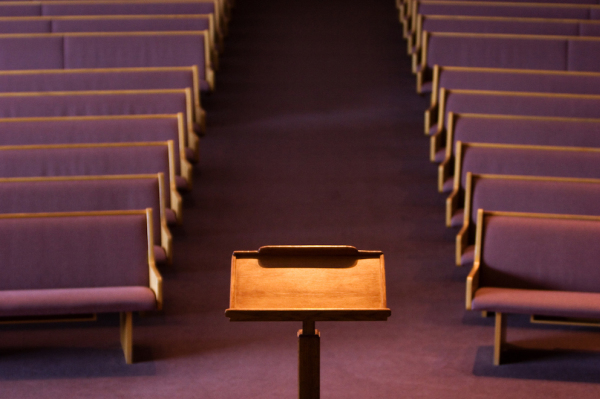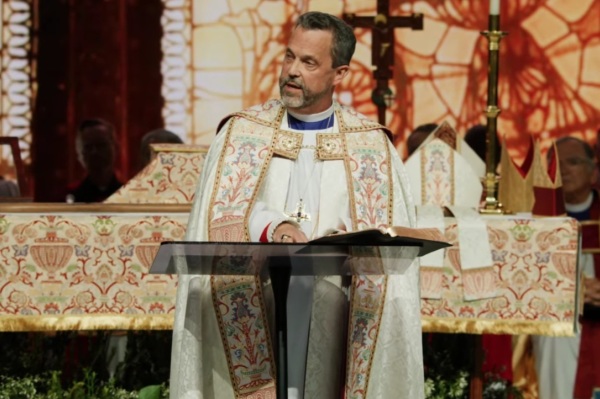Exploding the 'Myth of Culture'
The "myth of culture" needs to be exploded if the gospel is to penetrate the culture. Let me explain. I recently returned from a twelve day stay in Kiev, Ukraine. Having returned home, I am more convinced than ever before that the ‘myth of culture’ is a false barrier we have created that is inhibiting the advancement of the gospel of Jesus Christ and the expansion of the kingdom of God in some areas of the world, particularly America.
While in Ukraine, God either taught me or reminded me of some very important essentials while teaching at Kiev Theological Seminary. One particular thing – maybe the most important thing – God reminded me of is what I call the ‘myth of culture.’ That is, we too often think that people in differing cultures are really different not only in their cultural practices but also in the nature of their souls. And if radically different, then when it comes to the gospel we need different gospels for different cultures. Unintentionally, concern for culture relativity has usurped a commitment to the one, true gospel. It’s as if we have made the gospel to suffer from a type of ‘multiple personality disorder.’ One gospel for this culture, one for the next culture – you get the idea. But is this true? Do we need a different gospel based upon differing cultures? Or, is the same gospel that saves in the Ukraine the same gospel that saves in Nashville, in Seattle, in Brazil, and so on…? Have we gone too far in the process of contextualization that we have failed to trust the gospel itself to save the sinner no matter his/her cultural background?
The reason the same gospel saves all who will repent of their sin and believe on the Lord Jesus Christ is because all people in all cultures are essentially the same. I have preached from coast to coast in America as well as Brazil, Italy, Puerto Rico, and now the Ukraine. Here’s what I have discovered. Scratch beneath the surface of what we call ‘culture’ and you will find that we are all the same. Yes, people in Seattle do things differently than do the people in the Ukraine, just as people in Nashville do things differently than the people who live in Puerto Rico. Yet, deep in the soul of every person is an ‘essential sameness’ that the gospel speaks to with power and truth.
No matter where one lives, no matter the background of a person’s culture or heritage, this ‘essential sameness’ cab be distilled into five issues. That is, all of life can be filtered through these five issues. These five issues have helped me minister to people in different cultures, from different backgrounds with differing cultural traditions. Cultures do differ. People do things different in different ways from family to family, from region to region, from people group to people group, from country to country. I am not opposed to recognizing and appreciating our cultural practices. Such practices make life interesting. What my concern is is that we have so emphasized understanding culture that the gospel has become subservient to the culture. Relevance has become THE key issue rather than gospel clarity. Being relevant is relevant, but not if the gospel is minimized. We have many cultural technicians in the church without gospel competence.
Let me say it again, scratch the surface of what we call ‘culture’ and you will find beneath the surface that all people everywhere desire the same things. Why? Because all people are made in the ‘image of God.’ This image, though corrupted by sin, makes us common ancestors of our great Creator God and it makes us desire the same things. The reason the gospel of Jesus Christ is so powerful is because it meets all five needs. All five issues can be put in the form of a question. What are these issues?
1. Is there a God? If so, what is God like and what does this mean for life? If there is no God, then what does this mean for life? This is the spiritual question, the belief question! All people everywhere have some type of spiritual or non-spiritual belief based upon their answer to this question. This spiritual belief may vary from atheism, to agnosticism, to animism, to various modes of meditation and contemplation. This is a universal essential. We are incurably religious.
→ The gospel answers this question by reminding us that there is a God. That this God is holy and loving, merciful and righteous, a God who has revealed Himself 1) in His creation, 2) in His Word, and 3) in His Son as the One, True God in three persons – Father, Son, and Spirit – and who has spoken to us through His Word as God works through His church to evangelize the lost and to bring the kingdom of God on earth as it is in heaven, gladly waiting for His second coming. This was Paul’s tactic in Athens as he preached the gospel of Jesus Christ, Acts 17:22-34. He simply recognized the universal religiosity of the people within earshot and then preached the gospel.
2. Who am I? Am I a cosmic accident? Am I the by-product of evolutionary processes? Or, am I a unique creation of God? This is what I call the question of self-identity. All people everywhere desire to know who they are. All people desire to know if they have meaning and purpose. In fact, we spend a great deal of our lives attempting to understand who we are, where we came, and what our destiny is. If we are incurably religious, we are also individually analytical.
→ The gospel answers this question by reminding us that we are created in the image of God. Though this image has been corrupted by sin, in Jesus Christ we are made new creations (2 Corinthians 5:17), given new birth (John 3:3) with a new self (Eph. 4:17-32). In brief, 1) we are special by creation as made in the image of God, 2) we are sinners by reprobation as rebellious against our Creator, 3) we are saints being justified by faith in Jesus Christ, and 4) we are sanctified by the Spirit as new creations in Jesus Christ. Our identity is ‘in Christ’ as we’re remade and renewed as a new creation.
3. Who are you to me? This is the question of relationship! This question covers the relationships between individuals, in families, between nations, etc. In fact, economics is a form of relationship based on currency. Politics is about relationships. What happens in the church is all about relationships. How we relate to each other is an all-consuming feature of life. While we are incurably religious and individually analytical, we are also relationally connected.
→ The gospel answers this question by reminding us that as we were made relational creatures who relate to God through grace and love God, a grace and love that enables us to love our neighbors, both believer and unbeliever alike (Matthew 22:34-40).
4. What should I do with my life? Should I be a preacher, a missionary, a farmer, a politician, a businessman, a criminal, an artist, a writer, etc.? This is the question of vocation. That is, what should I do with my life? Along with this question comes the question – Does my work have meaning and purpose? Does what I do make any difference at all? Or, is my work futile and empty? It doesn’t matter if you live on the African plain, reside in the crowded city of New York, or live in a remote village on the frozen tundra of the Gulag, we desire to know what to do with our very fragile and brief lives. Incurably religious, individually analytical, and relationally connected, we are also vocationally quizzical.
→ The gospel reminds us that our vocation – no matter if it’s sacred or legitimately secular – can bring glory to God. In fact, 1 Corinthians 10:3 reminds us that we are to do all things for the glory of God. This makes the work of the farmer and the missionary important to God because both can bring glory to God (Colossians 3:12-17).
5. Finally, what happens when I die? This is the question of eternity! When I die do I cease to exist? Is there such a thing as reincarnation? Or, is there a heaven and hell? We are, as it were, eternally challenged.
→ The gospel reminds us that there is a heaven and hell, there is an eternity (Hebrews 9:27). Because we are made in the image of God there is a longing for another world. God has set eternity in the heart of mankind whether or not humanity acknowledges this truth. The gospel answers this question by reminding us that there is an eternity – heaven or hell – whose destination is decided by how one responds to the gospel of Jesus Christ in the here and now.
So, let the guy in south Alabama enjoy his sweet tea and the lady in London her hot tea; let the person in the Ukraine enjoy her borsch and the person of the upper plains of America his chicken-noodle soup; let the tribesman of the middle plains of Africa enjoy his exotic cuisine and the Texan her grilled steak. Let Celtic music sooth the soul and Asian artistry enamor the mind. Yet, let the one, true gospel be preached to all people whom God “made from one man every nation of mankind to live on all the face of the earth” (Acts 17:26). And let every sinner hear the good news, responding with repentance and faith so that when all is said and done “a great multitude that no one can number, from every nation, from all tribes and peoples and languages, standing before the throne and the Lamb” will say with one voice “salvation belongs to our God!” (Rev. 7:9-10) It will be on that day that the ‘myth of culture’ will finally be exploded by the triumph of the one, true gospel – Jesus Christ!





















